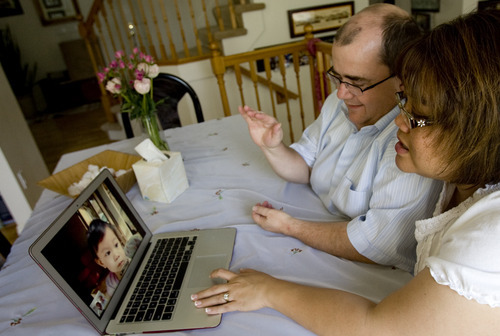This is an archived article that was published on sltrib.com in 2012, and information in the article may be outdated. It is provided only for personal research purposes and may not be reprinted.
Roy • Jhan Jensen's fingers barely graze the screen of the iPad. It's the closest he can get to his 14-month-old daughter.
For more than 11 months, these once-a-week video conferences are sources of joy and pain.
She has taken her first steps, graduated from baby formula to Cheerios and started to talk. Jensen believes if he were with her, "Da-da" would've been among her first words.
Instead, Miriam stares at him through the iPad screen with big brown eyes — confused by the technology that allows her to be seemingly so close to Jensen and yet actually be more than 8,700 miles away from him in Kuala Lumpur, Malaysia.
Jensen waves to the screen and calls out her name. Next to him, his sobbing wife is going through a box of tissues kept at the ready.
"It's so frustrating. I just want to hold her," Jensen said, reaching up with empty arms. "I want to hold my little girl."
But, for now, Jensen must wait for either a long-shot humanitarian visa to cut through a thick tangle of immigration law or spend at least one more year watching his daughter — via video — grow up in Malaysia.
The Roy father fears the latter will be true. Still, Jensen says, he's her dad and wants her to know that he won't give up.
"I love her," he said.
—
Only five since 2007 • Adopting a child from Malaysia is so difficult, no agency in Utah listed by the State Department offers assistance to families attempting to do what the Jensens are doing.
Since 2010, there hasn't been a single legally adopted child brought from Malaysia to the United States. Since 2007, there have been five.
Part of the difficulty stems from the Malaysian government, which tightly regulates adoptions by requiring potential parents to sign a two-year waiting agreement — called a "fostering period" — during which the birth mother can reconsider her decision to give up the baby.
During those two years, the potential parents are designated as "legal custodians."
The effort, according to officials at the Malaysian ministry, is to avoid having children become the victims of human trafficking.
The problem is U.S. Citizenship and Immigration Services won't grant citizenship to the child because full parenthood hasn't been bestowed on the couple. And the State Department won't issue a tourist visa because the child wouldn't be returning to Malaysia.
The Catch-22 leaves the Jensens in limbo.
Beth Fineman, spokeswoman at the State Department, said little can be done and noted that a few countries such as Malaysia pose difficulties for prospective parents looking to adopt.
She said, for example, there are no adoptions out of Guatemala because of fraud and instances in which biological parents never gave up the child.
"Our main goal in facilitating inter-country adoptions is making sure the families are matched with a good, loving home," Fineman said. "But certain steps have to be followed in the country."
There are also categories of adoption.
The State Department lists Malaysia as a nonparticipant of The Hague Adoption Convention, meaning there aren't the additional protections offered to families seeking to become parents of a child in an approved country.
The Hague Adoption Convention of 1993 seeks to protect children from being exploited through nefarious adoption schemes related to human trafficking.
A key provision is the requirement of an accredited adoption agency disclosing fees connected with the process. The agency can charge for unpredictable expenses only under narrow circumstances.
But the Malaysian government has cracked down on its own by issuing restrictions on prospective parents, including the two-year waiting period.
Jhan Jensen said they have spent about $42,000 so far on legal fees, travel to Malaysia and lost wages. He said he has exhausted his time off work from Hill Air Force Base.
His wife, Farah, who is a legal permanent resident of the United States and a citizen of Malaysia, has been able to go a few more times, but she's also running low on days to burn with her company, an irrigation wholesaler in Salt Lake City.
"They've been great dealing with me," she said. "But it's a strain."
'Socioeconomic ties?' • Tim Wheelwright, a Salt Lake City immigration attorney who is working with the Jensens, said the humanitarian visa option has fallen through. He said not much else can be done at this point.
And an email from a diplomat at the U.S. Embassy in Kuala Lumpur indicated any attempt at obtaining a nonimmigrant visa by the Jensens on Miriam's behalf would require them to prove "compelling social, family or economic ties outside of the United States sufficient to overcome the presumption of immigrant intent."
Jensen said he wasn't optimistic.
"Really? Does a 14-month-old have socioeconomic ties?" he asked.
Currently, the child is being reared by Farah Jensen's brother and his wife, who have four children of their own ranging from ages 5 to 14.
In their house in Kuala Lumpur one Sunday morning, Miriam crawls over books in her "Daddy loves me" pajamas while the children play with her. When Miriam hears Jhan's and Farah's voices, she looks inquisitively at the camera, grabbing at it with tiny hands.
Farah's 40-year-old brother, Farouk Mohammad, said it's painful for them to see the Jensens unable to complete their family.
"Every time we read the emails from Jhan, we see the roller coaster they're on," Mohammad said. "We do this face to face every weekend and we see their tears. We feel their pain."
They video-chat via Skype on Saturday nights because Kuala Lumpur is 14 hours ahead and Sunday morning is Mohammad's only day off.
Jensen said he can never repay what the family is doing for him and they have tried to ensure the family is stocked with diapers, food and toys before they head back to Utah. But with four children in the Mohammad house, Jensen knows it's a strain on them.
And each visit to see the child comes with the most painful moments for Jhan and Farah.
"It's always tense when I leave and Farah leaves. The last time, Miriam knew we were leaving. She had to say goodbye to us five times," Jensen said. "Her [Farah's] sister and brother had to pull Miriam out of her arms and she was screaming. It just kills you. It's the hardest thing you'll ever see."
Uncertainty • He walks around the room of their split-level Roy home, unsure as to how to decorate it. Do they get a crib? A bed? What color should they paint the walls?
Jensen said that even though there's the two-year wait, it could take longer to get Miriam.
The uncertainty leaves the room caught between its former life as a home office and a little girl's bedroom — a TV with video game system on a stand, model airplanes on a bookshelf while the room is dotted with Disney characters.
He stands alone in the middle.
"One day I went to go wash my car and I was sitting there when a couple came in with a little girl about the same age as Miriam," he said. "She was climbing all over them. At that moment, I just thought, 'Why can't I have Miriam? Why can't I be with her?' "
He wipes his eyes.
Devon Brooks, an associate professor of social work at the University of Southern California and an expert in adoptive placements, said Jensen's fears were natural and were actually a good sign — even if they were painful.
Brooks said it demonstrated attachments between the parent and child and that, while the separation is "an unfortunate situation," it won't likely have long-term consequences for the father to bond with his adopted daughter. He also said that the laws in place are important to protect the welfare of children — even if that means a temporary separation between willing parents and a child.
"It's easy for me to say, I know, but they will still have a lifetime to develop a relationship and have special memories with the child."
'Miri! Miri!' • Jensen does most of his work on behalf of his daughter late into the night — zipping off emails to elected officials, immigration advocates and anyone else he can Google who might have a way to expedite Miriam's delivery to Utah.
So far, he has come up empty.
It leaves him to worry ("Did she fall down stairs?") or wonder if she's said another word before their next Skype session. On Father's Day, the dad without his daughter will watch her on the iPad and call to her, "Miri! Miri!"
His arms will be empty, his heart will be full and he'll just wait for the one thing she can give to him 9,000 miles away.
A smile.
dmontero@sltrib.comTwitter: @davemontero







